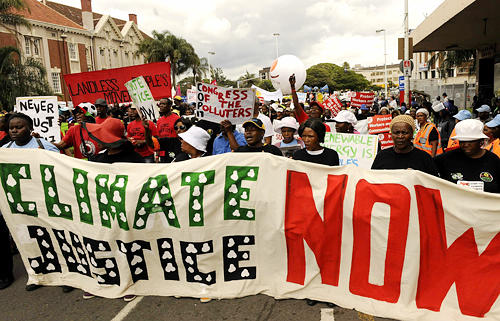|
 |
|
ACTION NOW: Members of non-governmental organizations hold banners in a demonstration in Durban on December 3, 2011, calling for the world to take action against climate change (LI QIHUA) |
"Now amid the financial crisis, it is difficult for President Obama to put the policies that he brought forward into practice," said Zhou.
Obama confessed the difficulty in pushing forward the climate actions in the United States was due to obstacles from the U.S. Congress.
"I talked about reducing America's dependence on oil when I was running for President, and I'm proud of the historic progress that we've made…But I've got to be honest. We've run into the same political gridlock, the same inertia that has held us back for decades," said Obama in a remark on America's Energy Security at Georgetown University in Washington, D.C., on March 30, 2011.
The resolutions reached at dawn didn't bring light for the public. Instead, it cast shadow on global climate cooperation, said Kumi Naidoo, Executive Director of Greenpeace, an independent global organization devoted to protecting the environment and world peace.
The United States and some other countries that hinder the climate talks have successfully kept a door for themselves. If the door is not locked, the United States will possibly keep delaying the talks on a legally binding global climate treaty that the world needs urgently. This will be a disaster for the Earth that all human beings lived on, said Naidoo.
Although the environmental protection force is strong in the EU, currently it is suffering from huge economic difficulties. What's more, it doesn't understand the real condition of developing countries but insists that the Kyoto Protocol should cover emerging economies such as China and India, said Zhou.
During the conference in Durban, the EU called for a global climate framework engaging all major economies. It insisted that the global climate action must be led by the major economies in both the developed and the developing worlds since they are the biggest emitters.
"Developed countries lack the political will to reduce emissions and provide finance and technology transfer to support developing countries. The lack of political will is the main element that hinders cooperation on addressing climate change in the international community," said China's View on the Durban Conference, a press release issued by the Chinese delegation in Durban on December 10, 2011.
"The Durban Conference did not succeed in accomplishing the negotiations under the Bali Roadmap. The implementation of the Cancun Agreements and the Durban Outcome will not be achieved in the short run. A heavy load of work ahead on the post 2020 arrangement needs to be done in order to enhance the implementation of the convention," said the release.
There is no legally binding international treaty that has no political background. Though the issue of climate change involves the world's common interests, it is still closely related to the current world political pattern. Developing countries can't be too naïve and expect developed countries to voluntarily take international responsibilities, said Zhou.
China can't give up defending the interests of developing countries in the international negotiations, said Zhou.
Xie Zhenhua, China's top climate negotiator and Vice Chairman of the NDRC, also responded in Durban on December 7 on the desire of more responsibilities from China.
"China's total emission amount has attracted global attention, but please don't forget, China is a developing country with a population of 1.32 billion people. China's per-capita GDP just surpassed $4,300. There are still 128 million people living on less than one dollar a day in China," said Xie.
China faces the tough task of promoting development, eliminating poverty and improving people's livelihoods. However, China has overcome all the difficulties and made arduous efforts in dealing with climate change, he said.
For instance, from 2005 to 2010, China's energy consumption per unit of the GDP dropped 19.1 percent, or a reduction of 1.46 billion tons of carbon dioxide emissions.
The Chinese Government has attached great importance to the issue of climate change, and regarded dealing with climate change as an important strategy and persistent policy in China's economic and social development, said Xie. | 